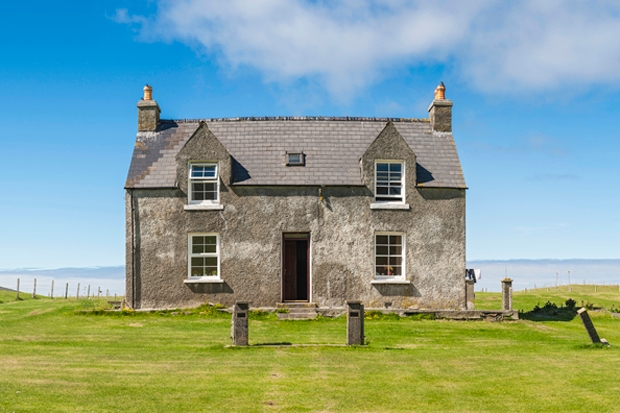‘Farm cottage available, Dorset. Long or short let. £5 per week.’ I was looking for a writing bolthole, so I rang. ‘Bit off the beaten track but it’s quiet all right,’ said the owner. It was also unfurnished. ‘We can get some basics together for you.’
So, in the summer of 1968, I drove down to Dorset and my first holiday cottage. It was backed by a large wood, surrounded by fields of dairy cows and meadows of wild flowers, bordered by elms. Remember elms? God’s finest trees. They whispered in the wind.
Furniture. A deal table and chair. Cooker. Enough crockery, cutlery and utensils for one. An armchair, old and comfortable. A bed, old and uncomfortable. A small table with a mirror. Pegs for hanging clothes. And a blue jug freshly filled with garden and wild flowers.
No ‘white goods’. No TV. I took my own radio and bedding.
I was very happy, wrote most of my book, and did not feel I lacked for anything.
Nor did I eight years later and married, when we rented a French stone farmhouse, ‘partially modernised’ — bath and hot water, but an outside chemical toilet. After dark trips meant brushes with toads, bats and other terrors of the French night, and hearing nightjars, nightingales and crickets while one sat.
Holiday cottage letting is a very lucrative business now and many are popular all year round. It brings money to the local economy, and who am I to complain about second homes when I occasionally rent one myself? I have become an expert and, given the prices charged, a fussy one. For £5 a week, I did not complain about my friendly Dorset farm cottage. £500 or more a week is another matter.
Yet even for this money, cottage owners do not always give value — which, in my book, means not fancy decor or massed knick knacks but essential comforts, starting with good beds. If only they would put a good bed before a costly gas barbecue. Cheap beds are hard beds. There is strong competition in the holiday letting area, and reports of bad beds will send customers elsewhere, as will sitting rooms furnished with uncomfortable chairs and curious low tables gathered from spare rooms and salerooms. We recently found one decent chair in a cottage for six. The tiny sofa apparently had a concrete base and the only other seat was a high chair.
Evenings spent shivering before pretend coal electric fires giving out more light than heat are miserable, especially when the widescreen TV has 40 channels but no instructions for the remote. I read. Pity about the 25 watt eco bulbs. If Wi Fi is advertised it must be there and work, as must cookers, fridges and freezers — and these must be checked occasionally for broken knobs and trays.
Some renters charge highly because their properties have been styled by an interior decorator. We went to one whose designer had a thing about bright purple and ‘accents’. There were bright purple cushions with curious rubber stipples, contorted vases, weirdly shaped lamp bases and chairs with tall thin backs, upholstered in bright purple velvet, which had cast iron seats.
Pictures come in three types. Reproductions of famous paintings by French Impressionists, local views by local artists, probably related to the owner, and abstracts: the least said about those the better. Our last place had coloured postcards framed in passe partout. I didn’t know you could still buy passe partout.
Every rented house has its Book, containing essential instructions about keys, the boiler and the vagaries of the cooker — ‘Never have ring right front and the grill on together.’ ‘ALWAYS turn key two and a half turns anti clockwise in the lock.’ ‘Do not try and unlock the cat flap or the neighbour’s cat will enter.’
There are lists of local pubs and restaurants (two years out of date), shops and garages (now closed) and emergency numbers for the local hospital (30 miles away), fire service (40 miles) and police station (95 miles and unmanned at weekends and bank holidays). Then usually there are details of local attractions, where to hire a quad bike, get a riding lesson or take a hot air balloon, plus maps of arduous hikes (‘a gentle one this, only nine miles over moderately hilly terrain’).
Of course there are plenty of comfortable, well equipped holiday cottages where everything works and the beds are as comfortable as your own, with good lighting, generous wardrobe space and well chosen furniture. I know a few and they are not by any means the most expensive.
But I sometimes think back to my £5 a week Dorset cottage and the French farmhouse with outside chemical loo and wonder if I wouldn’t be just as happy in them now, 40 plus years later. Even though thunderstorms did put everything out for days on end and I wrote books by candlelight.







Comments